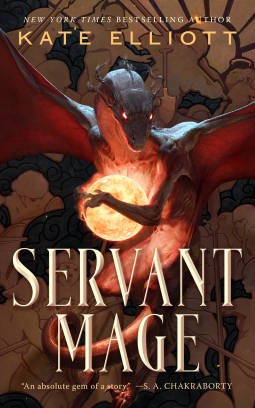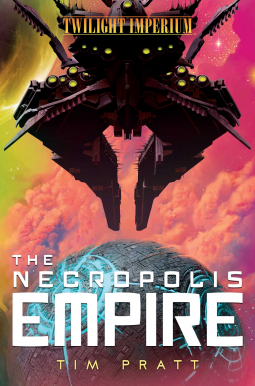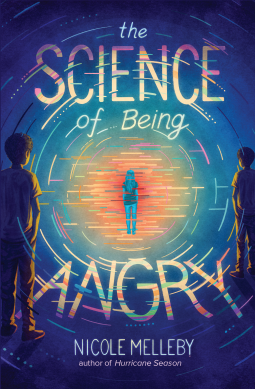Here are some more reviews of books I’ve recently enjoyed recently.
Servant Mage, by Kate Elliott (Tor)
Kate Elliott always delivers entertaining stories with relatable characters, and Servant Mage is no exception. Indentured fire-mage Fellian leads a drab life, half-starved and clinging to memories of her childhood, before the rigid, fundamentalist Liberationists came to power and enslaved anyone with magical power. The usurped Monarchists have formed an underground rebellion, and they need Fellian’s Fire magic. Of course, one among them is devastatingly handsome, thereby setting expectations of romance to come, as well as the restoration of a noble, altruistic king.. Here’s where Elliott departs from the usual and becomes deeply subversive. Fellian holds steadfastly to her own values when presented with an attractive man and the lure of a benevolent monarchy restored. Instead, she asks piercing questions and relies on her own judgment, time and time again. She is keenly aware that the other conspirators need her special talent, and she’s not about to exchange her autonomy for a new community. In short, she thinks for herself. Through her, Elliott strongly questions the romantic notion so prevalent in fantasy: the noble aristocracy, devoted to the welfare of their subjects. Fellian insists that to trust future generations of entitled rulers is folly and that exchanging one form of top-down rule for another is no guarantee against despotism. This emperor might be just and fair, but in a generation, common people like her might find themselves just as oppressed.
I love how respectful Elliott is of her readers’ intelligence. She plays fair and gives us all the information we need (such as Fellian’s passion for literacy in teaching fellow servants to read and write) without ramming conclusions down our throats. She lets the characters and unfolding events speak for themselves without telling us how to feel about them. For this, and for superb storytelling and compelling characters, I’ll grab anything she writes!
The Necropolis Empire, A Twilight Imperium Novel, by Tim Pratt (Aconyte)
Tim Pratt writes a lot of very cool science fiction. From his “Axiom” series (my gateway into his work) to The Doors of Sleep (which I really, really hope will become an entire series, now that there’s a sequel) to his “Twilight Imperium” novels. When I reviewed the first of these, The Fractured Void, I had no idea that Twilight Imperium is a war-without-end strategic game. I wrote, “Game tie-in novels are common these days, but not those that are so well crafted as to stand on their own merits. I picked it up because I loved Tim Pratt’s other science fiction novels (and after reading it I still have no idea what Twilight Imperium is, nor do I particularly care as long as Pratt turns out books as good as this one).” That’s even more true for The Necropolis Empire. If you, like me, are so much Not a Gamer that you’re into negative gamer-ness, just ignore that part and enjoy the book as a great science fiction tale.
Standing on its own, The Necropolis Empire falls into one of my favorite science fiction subgenres: spooky alien ruins. In this case, very, very old alien ruins from a race we’re really glad has gone extinct. Now if folks would just stop trying to resurrect their tech…
Our young heroine, Bianca, lives on one such world, a pastoral culture built on top of the aforementioned, deeply buried alien tech. Scavenged bits are useful, but mostly the farmers go about their lives…until a ship from the imperialist Barony of Letnev arrives, annexes the planet, and carries Bianca away with a rather incredulous story about her being a space princess. Bianca falls for it, though. Not only is she adopted, but rather than settle down with a nice neighbor boy, she has always yearned for something beyond her own world. That something becomes clearer when she begins changing, developing superhuman speed, strength, senses, healing, and more. The ruthless Letnev believe she is the key to finding and controlling the ancient military relics, which they mean to use to dominate all known space. Bianca has other ideas.
I absolutely love how vulnerable and how competent Bianca is. Her confidence in herself and her abilities stems from more than her new, superhuman powers. As a child, she was wanted and cherished, never coddled but given responsibilities. She grew up with permission to tackle all manner of challenges, and she’s a genuinely nice person. The Letnev, not so much. They’ve perfected arrogance to an art form.
I would be perfectly happy to see an entire series of “The Adventures of Bianca,” although I sadly fear the good folks who’ve created Twilight Imperium are more interested in promoting their game and not so much in a fascinating character who stands on her own.
Scandal in Babylon, by Barbara Hambly (Severn House)
I loved Barbara Hambly’s Bride of the Rat God, a fantasy set in Roaring 1920s Hollywood. Now she returns to that era, with its glamorous silent film stars, bootleggers, gangsters, drug use, widespread corruption, and the frenzied exuberance that followed World War I. In this story, a murder mystery (without Bride’s supernatural elements) the viewpoint character is Emma, a young British widow who now works as a companion and secretary for her superstar sister-in-law, Kitty. Classically trained, Emma is constantly affronted by the wildly inaccurate movie scripts (Kitty is currently starring in The Empress of Babylon), many of which she is called upon to rewrite on the spur of the moment. She’s also embarked on a possible new romance with cameraman Zak. To complicate matters further, Kitty’s real life is as melodramatic as her screen characters. She is a generous person for all her antics, especially loving to her three adorable Pekinese. When Kitty’s dissolute ex-husband, Rex, is found murdered, it looks very much as if someone is trying to set Kitty up to take the blame and is doing a very bad job of it. A deliberately bad job?
Drenched in atmosphere and fascinating historical details, featuring vivid characters and snappy dialog, Scandal in Babylon is Hambly at the top of her form. The pacing and depth of the scenes are wonderful, just the right combination of page-turning action, whodunit tension, and moments of reflection and personal growth.
Rumor has it that Scandal in Babylon will be the first of a new series. If so, sign me up!
The Science of Being Angry, by Nicole Melleby (Algonquin Young Readers)
Eleven-year-old Joey lives in an unusual blended family. For one thing, she had her two twin brothers have two moms, one of whom was married before and has a son from that marriage. She and her brothers were the result of IVF, and the boys are identical, having split from the same egg. For all the nontraditional nature of this family, there’s a lot of love and acceptance. But all is not well with Joey. She’s been having increasingly volatile episodes of anger and acting-out. Her temper has become legendary at school, where she’s been given the nickname, “Bruiser,” after she threw a soccer ball at a boy in gym class so hard she bruised his collarbone. She’s roughly pushed away her best friend, on whom she also has a crush. Now she’s left with the fallout wreckage of what she’s done.
Despite the efforts of her moms to help her, Joey’s outbursts are only getting worse. Finally, she melts down into a tantrum so destructive, her family is evicted from their apartment and must move into a motel, where close quarters fuel everyone’s irritation. Her moms start bickering, and Joey thinks that’s her fault. Her older brother, who is trying to focus on his academics, goes to live with his father, and of course, Joey blames herself for that, too.
Joey can’t understand why she flies into a rage or how to control it. All her best intentions are in vain. Then she gets the idea that perhaps her temper is a genetic trait inherited from her biological father. If she can just track him down, she thinks, she might better understand her own volatility—and he might have found successful strategies for managing his anger. With the help of her alienated best friend/crush, she embarks on a genetics project for science class. And, of course, nothing goes the way Joey expects.
In many ways, Joey is a typical adolescent, struggling with the tensions between immaturity and independence. In others, though, she is very much her own person with a unique family. I loved the way the unusual marriage and relationships are presented in a matter-of-fact way. Joey’s anger is clearly not caused by her having two lesbian mothers. Indeed, the clear love and understanding between her mothers, the way each of them has found her way to an authentic life, are one of Joey’s principal strengths. I also noted very little along the lines of, “girls don’t have anger management issues,” when in fact psychological research shows that girls experience anger as frequently as boys do (but are socialized to suppress it).
What I most loved about this book was the respect with which Joey and her problems were portrayed. Joey is in many ways still a child, and for all her competence in many areas, she has a child’s limited resources for dealing with psychological issues that confound many adults. Her sense of responsibility often leads her to shoulder disproportionate blame, to withdraw rather than harm someone she loves, and to keep her pain to herself. She confronts an issue all of us face, regardless of how old we are: when do we ask for help, and when do we rely upon our own resources? In the end, Joey realizes that she cannot master her temper by herself, and—more importantly—that there is kindness, understanding, and help available to her.
Highly recommended for adults as well as their adolescent children.
Noor, by Nnedi Okorafor (DAW)
Okorafor’s work invites us into a world of the future, but one in which the foundational culture is not derived from Western Europe but situated in Africa. Her underlying premise is that the Africans of the future, in this case Nigerians, have developed their own rich technologies. Two stand out for me in this novel: harvesting solar and wind energy in the deserts of northern Nigeria; and the heroine herself, whose cyborg body has been extensively augmented. At the same time, herdsmen follow ages-old traditions. In Okorafor’s skillful hands, high tech and ancient ways of life blend into a seamless whole.
